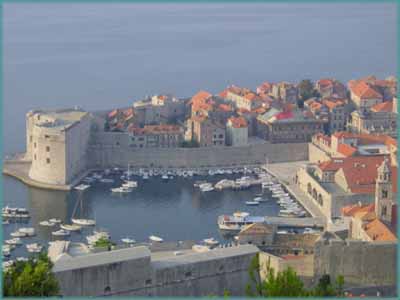Its funny, I happened to have the good fortune to be in Dubrovnik last week (formerly known as Ragusa).
The whole thing about the city is that it has this well preserved walls and fortresses that surround it. And these were key. Every day there was a whole elaborate routine to make sure nobody tried to sneak in and attack the city, and if they did, they would be trapped (double gates on each side) and get the old burning oil. And they city was attacked a number of times.
And this was not just happening in say the “Dark Ages”, this was the case until the 1600 or 1700s. And this wasn’t a backwater, it was a major city. (not as major as say Venice, but major).
Some implications for a campaign:
-
Political fragmentation: small city states and kingdoms, or larger entities where most power is held by vassals, and by their vassals. These are your points of light, but also darkness…not all will be nice, and they will fight, spreading the darkness.
-
Might is right: in the end, to stay in power you must resort to violence. This might be direct, or require using some special influence to get somebody to do it for you.
-
Limits to human (and similar races)
population growth: not essential, but plagues and disasters help make/maintain wilderness and cause discord. The presence of people eating monsters, evil cultists (who counter their goody-good counterparts), and high powered weaponry (character classes and their items and spell like abilities) could all contribute here.
-
Settle only where its worth it: In this dangerous world, you just don’t build a village anywhere. You need fertile land, water, some kind of communications, and, crucially, a defensible position. The lowland by the river might look great, but if something can just sweep down from the hills, it may not be such a good place to settle.
-
Trade and self sufficiency: Clearly much will have to be produced locally, but trade will be profitable enough for some to risk it. Coins can be used, as they where historically. (or think $100 bills: these are used mostly outside the US in the underground economies of many countries). Willingness to accept could just be based on the value of the mineral in them, a general perception of value, or even a relatively stable empire or city confederation that mints and accepts them. Any place peaceful enough, and with the right location, for trade to flourish, will become rich, hire their might, and then become powerful. Until they are wiped out.





